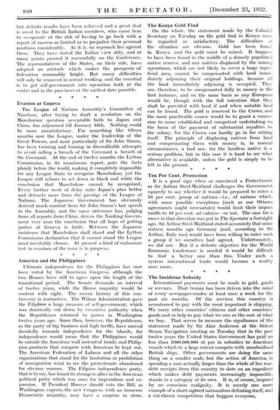America and the Philippines Ultimate independence for the Philippines has
now been voted by the American Congress, although the two Houses have still to agree upon the length of the transitional period. The Senate demands an interval of twelve years, while the House majority would be content with eight. The recent history of this con- troversy is instructive. The Wilson Administration gave the Filipinos a large measure of self-government, which was drastically cut down by executive authority when the Republicans returned to power in Washington twelve years ago. Since then, however, the Republicans, as the party of big business and high tariffs, have moved decidedly towards independence for the islands, for independence would mean that the Philippines would be outside the American wall instead of inside, and Philip- pine products that compete with American be kept out. The American Federation of Labour and all the other organizations that stand for the limitation or prohibition of immigration want to see the protectorate abandoned for obvious reasons. The Filipino independence party, that is to say, has found its strongest allies in the American political party which was once for imperialism and ex- pansion. If President Hoover should veto the Bill, as Washington expects, the new Congress, with an immense Democratic majority, may have a surprise in store.


























 Previous page
Previous page